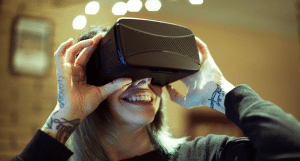With this ever-changing and evolving space of technology, how far is too far to be immersed in an experience?
I was asked this very question the other night at an event I was speaking at and it really got me thinking. My initial response is that this technology isn’t something that’s designed to replace reality, it’s virtual. We action the experience. Do we need to have the wind blowing in our faces as we “fly” through the air? Do we need to completely recreate this world, only to escape into one that is almost completely fictional?
As seemingly fictional as it is, however, it has been shown that technologies can and do have a real effect on peoples’ lives. In a highly criticised study in which Facebook manipulated almost 700,000 users’ news feeds by filtering what would appear, it was discovered that they had the ability to make people feel more positive or negative through a process of “emotional contagion”.
If emotions can be so easily manipulated by a mere newsfeed, what are the implications for a fully immersive virtual reality experience? And if we can experience real-life emotions through various technologies, does this mean we would prefer technology fuelled experiences as opposed to real-life ones, where we can control the emotion we feel?
This idea brings with it questions for a very deep topic on cognitive choice. As an advertiser, I’m always keen to influence choice in a positive way to increase bias or compassion for a brand. But these are typically short-lived points of influence and inspiration.
Would I promote the ability to completely escape reality? Probably not. However, if we look to the findings that social media has provided, the need to stay connected is more prevalent than ever.
We all love our phones. More accurately, we all love what lives in our phones. Sharing everything from what our kids are doing, to the fine dish we are about to eat as a means of staying connected to those nearest and dearest to us.
Which brings us to the next question: will the inevitable wave of virtual technologies bring a new way to completely engross yourself, but without the human element that previously fueled most online interactions?
We will always have those individuals in life that obsess and get lost in VR, we just need to look to the gaming industry as an example of that. People allow themselves to get lost in these virtual worlds – but it is a conscious choice to do so.
But in this very escape, I feel we lose track of the true innovation that took us there, to begin with. The idea that Mixed Reality isn’t a form of entertainment to help us escape our lives, but a practical extension of them.
So will virtual technologies take over the human world? Unlikely. Maybe if we mix it with AI and lose track of what makes us human, resulting in robots taking over the world…we scorch the sky to stop them…Neo appears. You get the idea.
Thankfully, the chances of THAT reality are (hopefully) slim. With every advancement in technology, humans will be there to innovate and create. More industry, more jobs, more ways to do, be, think and live.
After all, we are only human. VR is not designed to replace reality itself, or is it?








